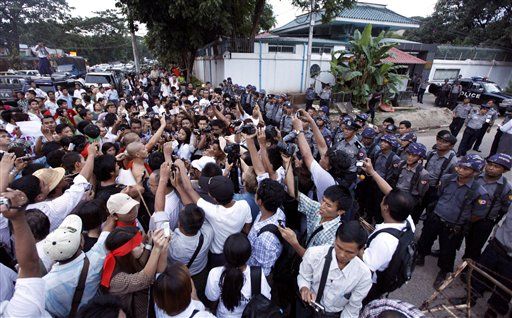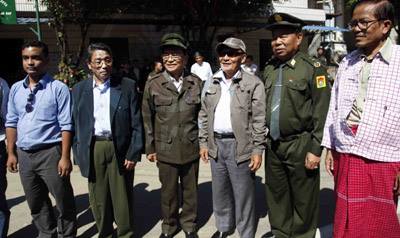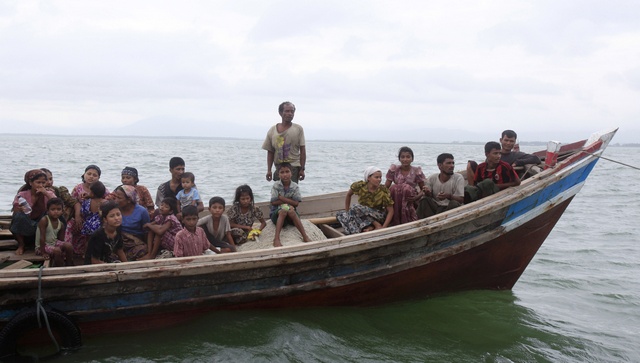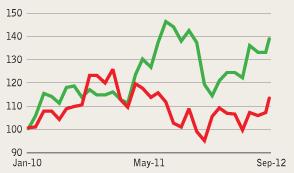Ups and down
One US dollar was buying 968 kyat on Friday, remaining the same as the week before. The selling rate rested at 975 kyat to the dollar.
The price of gold rose slightly to 690,000 kyat per tical on Friday. Fuel prices stayed the same – petrol 814 kyat per litre; diesel 920; and octane 920. The cost of rice and basic commodities was also stable at Rangoon marketplaces, with good quality rice selling at 1,100-1,200 kyat per basket.
Thilawa economic zone to open in two years
The Japanese-backed Thilawa economic zone is set to open in two years time, with the support from three companies: Mitsubishi, Sumitomo and Marubeni corporations. With a shared ownership of 49 percent, the Japanese firms will partner with the Burmese government and local enterprises to develop an industrial hub near Rangoon. The partners are expected to pay about 17 billion yen (US$174 million) on power, water and transport infrastructure for the site, which aims to export electronic parts and clothes across Asia.
Burma to rewrite mining law to attract foreign investment
Burma is planning to drastically rewrite its 1994 Mining Law in a bid to attract more foreign investment in its extractive industries. As much as 70 percent of the existing legislation is set to be amended, according to government officials. The current law includes several stumbling blocks for foreign investors, including a requirement to enter into a production sharing contract with the Ministry of Mines. The ministry is subsequently entitled to around 30 percent of all minerals extracted, as well as the relevant taxes and royalties. The protectionist law also bans foreign companies from exporting ore, coal and gold in order to ensure that processing takes place in-country.
Thai-registered company to seek loans for Dawei SEZ
The Burmese government is planning to register a joint Burmese-Thai company in Thailand to seek loans to implement the Dawei Special Economic Zone (SEZ). The company will also allow for the creation of revenue for the Thai-backed project by selling shares in Thailand, Burma’s Deputy Transportation Minister Han Sein told parliament this week. Shares will also be sold in Burma once the country sets up its own stock exchange. The proposal follows a failed attempt by Thailand and Burma to persuade Japan to support the project. Han Sein said that their goal of developing a highway road, industrial zones, factories, commercial buildings, residential areas, hospitals and schools in the SEZ were unlikely to be met by 2015 as originally hoped.
Garbage power
The South Korea-based Chasson International Group and a South Korea-Burma joint venture, Zaya & Associated Co Ltd and Hyundai Rotem Company, have been awarded contracts to generate electricity from two garbage dumpsites in Rangoon. The projects have an estimated investment value of between US$180 million and $230 million, according to Than Lwin Oo, head of the Rangoon municipal’s Pollution Control and Cleansing Department. He said the electricity generated from the garbage will be bought back by the Rangoon municipality at 150 kyat per unit and then distributed to industrial zones around the city.
Burma’s rubber exports receive boost
Burma has earned more than US$102 million in raw rubber exports in 2013, up from $94 million last year, according to the Ministry of Commerce. More than 40,000 tons of raw rubber was exported from 1 April to 11 October 2013, although this season’s heavy monsoon rains reportedly hampered production.
Thai pharmaceutical firm steps up Burma presence
Mega Lifesciences Plc, the wholly owned Thai pharmaceutical and consumer health firm, plans a Burma expansion with a new warehouse costing 300-600 million baht (US$96,500 – 193,100) to store pharmaceutical and consumer products. Chief executive Vivek Dhawan said the company will in next year’s first quarter propose to the Burmese government building the warehouse on 25 rai [40,000 m² of land] in Rangoon. Construction is expected to start by 2015.
Read more: http://www.dvb.no/news/thai-pharmaceutical-company-steps-up-burma-presence/33922
Burma rated as one of the worst places to do business
Burma is among the worst places in the world to do business, according to a new report by the World Bank. The annual “Doing Business” report ranked Burma 182 out of 189 countries studied, citing its poor regulatory environment and limited protection for investors as key obstacles. Foreign investors have flooded the country following the stripping of western economic sanctions, but the report warns that archaic laws and bureaucratic systems may stifle entrepreneurship. The report said there was “considerable scope” for reform but praised government efforts to improve business regulations, including introducing corporate tax breaks under the 2012 Foreign Investment Law.
Read more: http://www.worldbank.org/en/news/press-release/2013/10/28/for-the-first-time-this-years-doing-business-report-measures-regulations-in-myanmar







